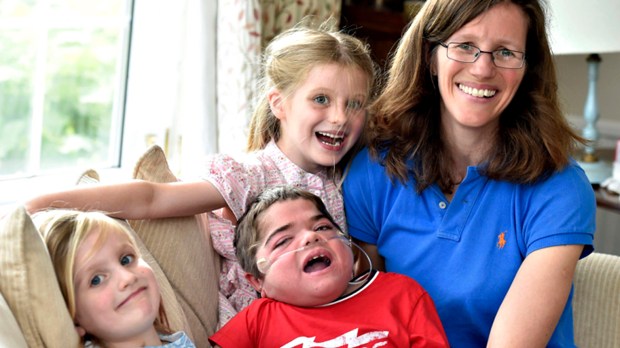Imagine living in a world in which you have no voice. You sit and watch and take things in, but you have no way of relaying a thought, an idea, an opinion, or even a little sense of humor. Worse, most people assume that you’re not capable of even experiencing these things.
This was the life of 10-year-old Jonathan Bryan until two years ago, when his mother Chantal discovered a way to communicate with him. Jonathan’s story is not simply remarkable and heart-warming, it reveals the inner strength of a clever and loving boy, and the determination of his family to give him his “voice.” And what a voice he has!
Read more:
How caring for her disabled daughter changed this mom’s life for the better
Jonathan was born early at 36 weeks by emergency C-section after Chantal was in a car accident. Her placenta had detached itself from her womb, depriving Jonathan of oxygen. The outlook was bleak; Jonathan was born with failing kidneys and a brain scan revealed that he would be extremely disabled, unable to walk, talk, eat, in addition to other activities most of us take for granted. In a blog post about Jonathan’s story, Chantal recalls one of the hospital’s doctors saying, “It’s one of the worst scans of a brain the technician has seen.” Although Chantal and her husband, Christopher, an Anglican vicar, had consulted with experts about whether Jonathan’s treatment should be stopped, Chantal says “there was something about him. A knowing look. The look of someone who was ‘in there’.”
He fought on.
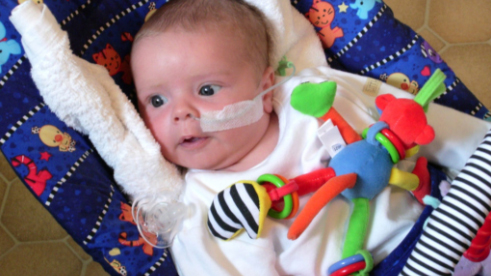
Seemingly “locked-in” and with cerebral palsy and weak lungs, Jonathan was enrolled in a special school, where he was described as having “profound and multiple learning difficulties.” Chantal believes this is fundamentally where the problem lies, at least in her native England: children who are non-verbal and physically handicapped are labeled incorrectly and attend these schools to essentially be “babysat.” And this is where Jonathan’s—and Chantal’s—incredible story really begins.
Read more:
Are you saying that because I am disabled, I shouldn’t have been born?
On the day after Chantal, Christopher, Jonathan, and his younger sisters, Susannah (seven) and Jemima (four) came back from their summer vacation, the siblings were all playing in a tent in the backyard, and I was fortunate enough to sit down with Chantal for a lengthy conversation. I asked her how they managed to go on vacation given Jonathan’s many requirements (he needs constant care day and night). She explained that they stayed fairly close to home—just in case—and that Jonathan joined the family on walks along the sometimes rugged pathways in his over-sized three-wheeler. Immediately it’s clear: despite Jonathan’s severe disabilities, he’s an integral part of their family life, not just in the extra care he requires, but because of his “big personality,” as Chantal describes it.
As Jonathan played with his sisters, Chantal shared the journey the family has taken so far, how Jonathan’s “unlocking” has revealed a little boy with big ideas about helping others, and how a visit to “Jesus’ garden” has brought hope and excitement for what lies ahead.
Breaking through
Despite all his disabilities, Jonathan was still very much “engaged with the world and keen to learn” from an early age. He could communicate with what his mom calls a “clear ‘yes’ and ‘no’ face.” And it’s this ability to choose that would allow Jonathan to emerge from his silence.
From a young age, Jonathan had a taste of mainstream education mixed with spending time at his local special needs school. While obviously grateful that her son’s physical needs were being attended to, Chantal believed something was lacking in terms of his mental development. So when he was seven and a half, Chantal made a decision that would turn Jonathan and his family’s life around: She decided to homeschool him every day for over an hour in the morning before he headed off to his special needs school.
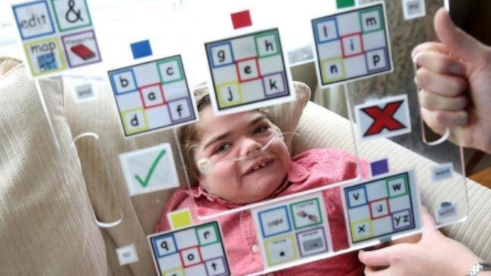
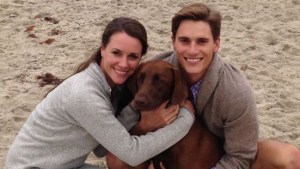
Read more:
Unborn baby with Down syndrome inspired father to run Boston Marathon
When I exclaimed to Chantal that she must have the patience of a saint, she said she’s “not patient, but determined; I’m not a saintly mother!” But her determination began to pay off, so the family decided Jonathan should be homeschooled for five full mornings and join the mainstream primary school four afternoons a week, leaving him with just one afternoon at his special school to see his best friend (who Jonathan believes can be “unlocked,” too). From there Jonathan took off.
A powerful and expressive voice
Chantal found that her son’s vocabulary was pretty extensive, in part thanks to the many books his family had read to him throughout his lengthy illnesses, so the word boards she had created were not quite sufficient for Jonathan to express himself. She soon realized he wanted to spell, and not long afterwards, he was writing sentences that would surprise any 4th grade teacher. Jonathan’s whole world had been unlocked and he was finally able to express the thoughts that had been trapped inside him for nine years. What he comes out with is both profound and perceptive. Jonathan explained to his mom that “I watch people and I pray; I watch and I look.” And through this process Jonathan has gleaned perhaps more insight than other young people his age.
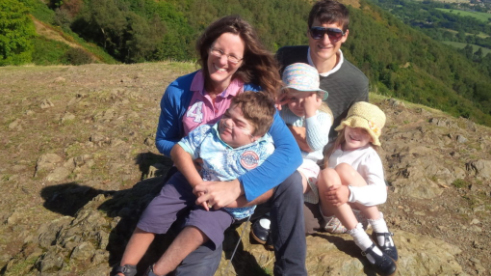
Read more:
How to help the developmentally disabled without hurting them
Jonathan has also expressed his desire to “bake every day, forever.” He spelled out, “I love baking for other people and making people happy.” This love of baking (helped by his family), is indicative of his beautiful personality, one of loving and giving, especially when we consider that Jonathan is unable to eat solid food himself and has to be fed through a tube in his stomach. He seems to be a boy with a tremendous heart and a fantastic outlook on life, making the most of what life has to offer. As Chantal says, Jonathan takes part in dance lessons at school in his wheelchair; the fact his friends are helping him move his arms feels to him like he is dancing.
Jesus’ garden
One of the most beautiful things Jonathan has been able to do is tell his parents about his visit to “Jesus’ garden.” Growing up in a religious family, Jonathan has been brought up “knowing Jesus.” But being able to communicate meant that Chantal could finally ask some important questions. (“What do you say to your son after nine years?” she says to me, laughing.) One of the first things Chantal asked her son was, “Who is important in your life?” To which Jonathan responded completely unprompted, “Mummy, Daddy, Jesus, sisters …” Then Chantal asked, “So when did you first know about Jesus?” Jonathan’s response was one of the most spine-tingling things he has ever told his family: “I’ve seen his house when I was ill. I was climbing up trees and my body worked.”
Chantal and her husband relate this incident to a near-death experience Jonathan had years before, but they can’t exactly pinpoint when (as there are a couple of contenders). Jonathan talks about going to “’Jesus’ garden,’ how he’s always happy, and he describes a lot of detail about a child who was there,” explains Chantal. Jonathan remembers the name of the child as Noah, a little boy in his previous parish who was a little younger and who died from an unexpected brain tumor. Although the family have spoken to Jonathan about heaven quite a bit—considering he’s nearly died a few times—Chantal says his description is “fresh” and not the stereotypical way we would describe it. When Chantal asked Jonathan, “How did you know it was Jesus’ garden?”, Jonathan’s matter-of-fact response was, “Because my body worked and I asked people.”
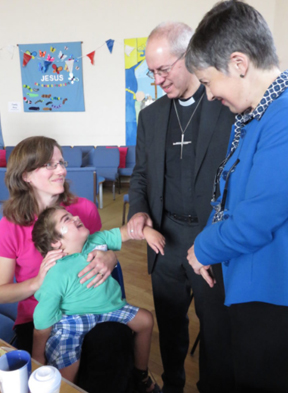
The joy Jonathan felt in Jesus’ garden has affected his outlook on life. During a recent serious illness, he actually spelled out: “I’m going to go back soon, it’s so exciting!” You can only imagine how difficult it was for the family to see emerging letter by letter. Jonathan has tasted the joy and experience of being free, and Chantal understands his excitement and wants what’s best for her son, but she and her husband don’t quite share the same enthusiasm for Jonathan “going back to the garden.” Yet, “He’s learnt to be content … that’s something a lot of us don’t quite get to. We talk to him about his faith and he prays a lot.”
Jonathan loves praying aloud now using the spelling board. But what is mind-blowing is his method: “He doesn’t think using words, he thinks using emotions, colors, and drumbeats. Praying is intentional, but he invites Jesus into the drumbeat of his life, and brings pictures of people before God when he is praying for them.” Jonathan is due to be confirmed this November because Chantal doesn’t know how much time they have left with him.

Read more:
The miraculous life of Gianna Masciantonio, a little girl kissed by the Pope
With a son so immersed in his faith, I asked Chantal about how her own relationship with God is today. “Deeper, I suppose; it couldn’t be anything other than that, having had a Jonathan! Shortly after he was born he was very ill. I got close to asking God, ‘Why?’ Not, why me … but why a tiny little baby who is suffering so much? And God gave me a picture that kind of stayed with me, which is just God the Father looking down at God the Son on the cross and with tears down his face saying ‘I know,’ and I follow a God who knows. He knows what it’s like to have a son who suffers and He knows what it is to suffer. So my faith is about getting on with it.” Chantal also spoke of the hope and assumptions we all have for our children, and how Jonathan’s story has led to a real life lesson: “Being human boils down to being loved and giving love.”
A boy with a purpose
Jonathan is now a young man on a mission. He’s set up a petition on change.org so children like himself can have access to literacy education and to erase the perception that the label “disabled” means a child has limits on learning. He has written to the Minister of Education, and is hoping to meet the Minister of Children and Families, who decides government policy in the UK for children with special needs. Jonathan believes this is his purpose, the one thing he wants to do before he dies. He went to the media and actually wrote a press release himself. He wants to change attitudes, to help people to see what children like him, who are supposedly locked away, are capable of achieving.
As for his younger sisters, Jonathan talks to them about his faith and is writing thoughts and guidance down for when he’s no longer here—the perpetual protective big brother.
And for us: I asked Chantal if Jonathan could write a prayer to share with our readers and he happily obliged:
Heavenly Father,
Thank you for loving children like me, giving us strength, courage and peace during our lives. Knowing You will greet us in Heaven brings great joy.
Please help give a voice to all children like me so they might be able to say what they want.
In the loving and glorious name of our Lord Jesus,
Amen.
By Jonathan Bryan—aged 10
If you’d like to know more about the remarkable and inspiring Jonathan, check out his autobiography, Life Adventures of awesome Jonathan, which can be found on his blog. You can also leave comments there for Jonathan to read.
UPDATE: Jonathan was finally confirmed in November, describing it as “the best service of my life.” During the ceremony, his godfather read a beautiful testimony that Jonathan himself had written. He has also gathered more than 179,000 signatures for his petition to help other “locked-in” children and met with the Minister for Vulnerable Children and Families, Edward Timpson.
Jonathan turned 11 in January surrounded by his family and chocolate cake. And to mark the big event, Jonathan wrote a Thanksgiving Psalm in which he says he is “Rejoicing in God’s lavished love.” But that’s not all. Jonathan decided that during Lent he would try to help raise money for charity and he ended the Easter period with the most powerful Easter poem: “Rejoice for Jesus Has Risen,” that was read out on BBC Radio Two by esteemed poet Ian McMillan (if you’d like to listen, forward to 1 hour 15 minutes).
We continue to be astounded by this remarkable child who is proof of what a mother’s love can achieve.
